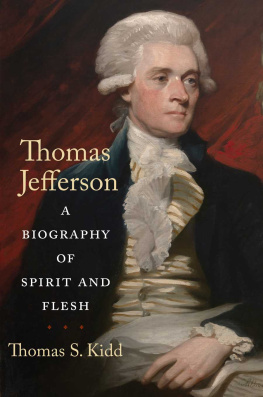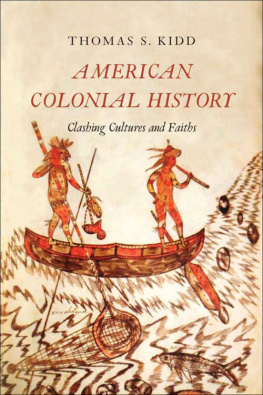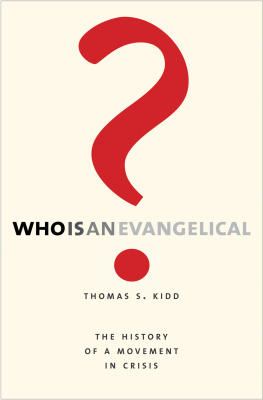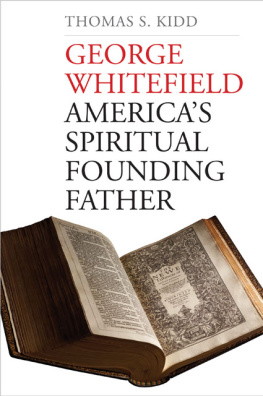In this volume of early American History through Civil War and Reconstruction, Kidd not only provides students with an exceptionally well-documented account of our political history, but an astute assessment of the Christian movements that shaped the course of our nation, be they the Puritans of New England or the evangelicals of the abolitionist movements. This clear and even-handed account cuts against the banality we find in most history textbooks today.
David Goodwin , president, Association of Classical Christian Schools
Thomas Kidd is a talented historian with a unique gift for in-depth research and engaging writing. This work is no exception. In this two-volume set, Kidd applies his skills to an area where they are desperately needed in America todaycivics education. Smart and fair, nuanced and balanced, Kidd takes us from the American Founding to the Civil War, from populism to progressivism, from World War I to the Cold War, from the Roaring Twenties to the Great Society, from Andrew Jackson to FDR, from Reagan to Clinton, from 1492 to September 11. Elegantly and attractively written and illustrated, this text is not to be missed for your student.
Paul Kengor , professor of political science Grove City College, Grove City, PA
There has long been a need for a survey textbook that gives balanced attention to the important role of Christianity in American history. Thomas Kidds American History admirably meets that need and much more. Well written, accessible, interesting, beautifully illustrated, and academically sound, this usable and one-of-a-kind resource deserves a wide audience in both the secular and Christian college classrooms.
Samuel Smith , graduate program director, history department chair, Liberty University, Lynchburg, VA
Thomas Kidd has spent years teaching us how to think Christianly and historically about our shared past. American History is an achievement worthy of all that we have come to expect from Professor Kidds pen. Thorough, engaging, and mature, this work will prove indispensable to students of U. S. history for generations to come.
John D. Wilsey , associate professor of church history, The Southern Baptist Theological Seminary, Louisville, KY
American History, Volume 1
Copyright 2019 by Thomas S. Kidd
Published by B&H Academic
Nashville, Tennessee
All rights reserved.
ISBN: 978-1-4336-4442-9
Dewey Decimal Classification: 973
Subject Heading: UNITED STATESHISTORY / UNITED STATESCIVILIZATION / UNITED STATESRELIGION
Scripture quotations are taken from the Holy Bible, King James Version (public domain).
The web addresses referenced in this book were live and correct at the time of the publication of the book but may be subject to change.
Cover design by Darren Welch. Artwork by George Caleb Bingham, American, 18111879; Jolly Flatboatmen in Port, 1857; oil on canvas; 47 1/4 x 69 5/8 inches; Saint Louis Art Museum, Museum Purchase 123:1944
Printed in the United States of America
1 2 3 4 5 6 7 8 9 10 24 23 22 21 20 19
VP
To Jonathan and Joshua Kidd
ACKNOWLEDGMENTS
T hanks to my wonderful, supportive colleagues at Baylor, including History Department chair Barry Hankins and Byron Johnson, director of Baylors Institute for Studies of Religion. Thanks to my Baylor research assistants, including Kristina Benham, Matt Millsap, and Paul Gutacker; to my agent and friend Giles Anderson; and to the great staff at B&H Academic, including Jim Baird, Chris Thompson, and Sarah Landers. As always, I am so thankful for my wife, Ruby, and my sons, Jonathan and Josh.
INTRODUCTION
W riting an overview of American historyor of any nations historyis a daunting task. Theres so much to cover, yet so much has to be left out. Most people who have ever lived left us little to no surviving records of their lives. Historical overviews usually focus on luminaries such as presidents, tycoons, inventors, and celebrities. And they focus on great events such as battles, economic disasters, and presidential elections. My overview of American history focuses a great deal on such characters and events too. But I have tried where possible to weave in anecdotes of regular people as well. Often my justification for weaving in such stories is their utter typicality, or the way they illuminate peoples everyday experiences and struggles.
Focusing on great events also risks giving the impression that those events had the same significance for everyone in America, but that has rarely been the case. Take the Revolutionary War journal of Baptist chaplain Hezekiah Smith, for example. The July 1776 weekend that the Declaration of Independence was signed, Smith wrote one line in his journal: Something unwell, tho kept about. He was sick and did not know about events transpiring in Philadelphia that weekend. What seems inordinately significant in retrospect may not have seemed so important at the time. Conversely, events and people that seem momentous at the time may not appear that way in retrospect.
To narrow the focus of this book and make it manageable, I have emphasized certain major themes in American history. Some of the focus emerges from my own interests and perspective. Readers should know that I am a Christian, and a Baptist in particular. I identify with the historic evangelical tradition and the faith of figures such as the Baptist champions of revival and religious liberty in the eighteenth century. This commitment profoundly shapes my view of history. Therefore, I give a lot of attention to religion. I admittedly think that religious people (which in America has mostly meant Christians), for all their faults, have generally been a force for good in American history. I also illustrate that Americas best ideas and most stirring speeches have often been rooted in the language and concepts of faith.
Another major theme of this book is racial and ethnic conflict. From the coming of the first colonizers, and the first shipments of slaves, racial tension and violence have been enduring themes in American history. They remain so today. There are obvious signs of progress in race relations in American history such as the end of slavery and the civil rights movement. But just when we think weve entered a post-racial America, racial controversies and racial violence roil American society again. These themes, both valuable and painful to consider, are ones to which Christian historians should give special attention.
A final major theme is the state of American culture, especially with regard to issues such as virtue, traditional moral norms, mass media, and entertainment. These issues are in the background of the whole book. Beginning in the late nineteenth century, however, entertainment and mass media have become progressively central to everyday American life. In an indirectly related development, our most basic cultural institutions, such as family and marriage, have come under increasing duress. Especially since the 1960s, Americans have been jettisoning some of our most basic assumptions about a good society and a wholesome life. We have simultaneously been amusing ourselves to death, in the words of scholar Neil Postman, as mass media, sports, entertainment, and marketing have become increasingly paramount in our daily lives. I tend to observe and describe rather than excoriate and prescribe in this book. But the accelerating pace of social change, and Americans concomitant obsession with entertainment, will be obvious.












